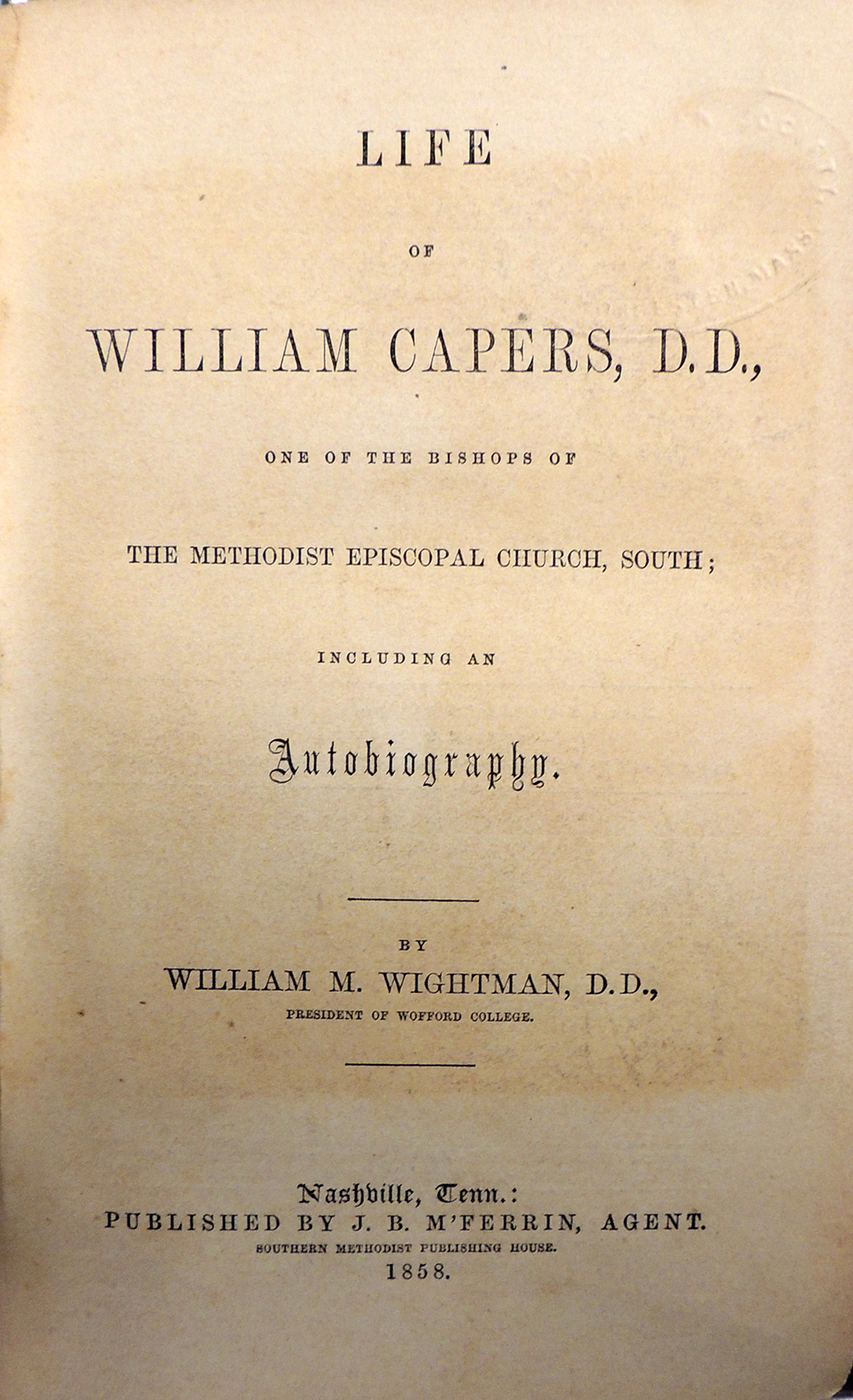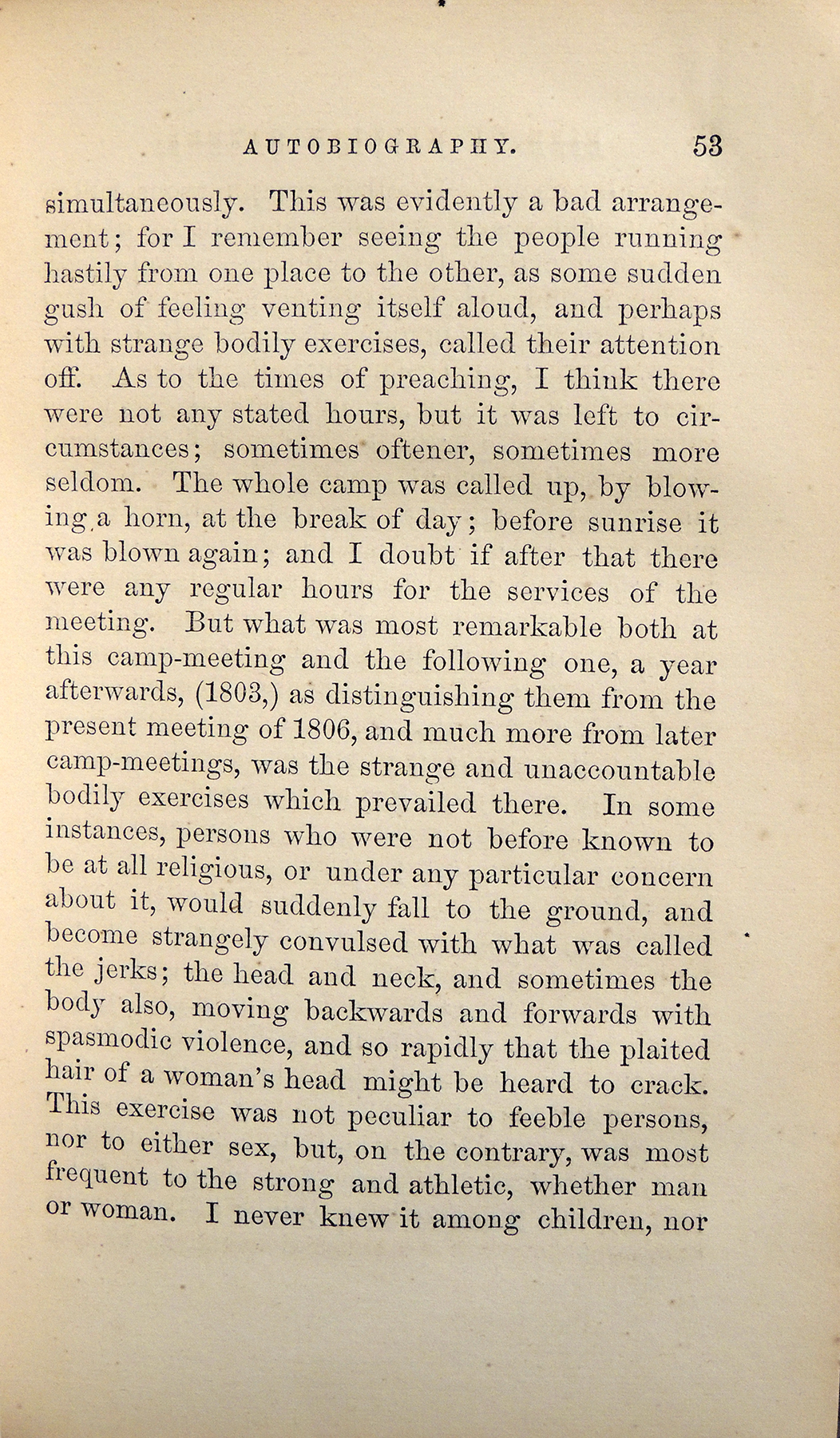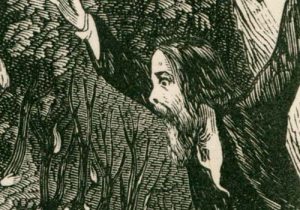In this short excerpt from his autobiography, Methodist bishop William Capers recalled witnessing the jerks as a young boy at a camp meeting near Stateburg, South Carolina, in 1803. Click here for the full text of The Life of William Capers (1858).
Another story of very different import, and yet somewhat connected in its origin with the preceding, belongs to this summer of 1806. Towards the latter end of the summer, a camp-meeting was held in Kembert’s settlement, where the people were mostly Methodists; and my uncle and family attending it, made it convenient for me also to attend. Of course this would be agreeable; for although I was not prepared to use it for the proper spiritual purposes of such a meeting, and yet had too high a sense of propriety to go to such a place for the purpose of electioneering, still, as my youth must protect me from any imputation of bad motives, it might be well enough to go just as a friend among friends, and to make more friends. Of this camp meeting my recollections are about as distinct as of most I have attended of later years. The number of people occupying tents was much greater than it had been at two previous meetings of the same kind, in 1802 and 1803, in that neighborhood; both of which I had attended with my uncle’s family, and at which wagons and awnings made of coverlets and blankets were mostly relied on, in place of tents. The tents too, (of this meeting in 1806,) though much smaller and less commodious than in later years, were larger and better than at the former meetings. But still, at the tents as well as at the wagons of the camp, there was very little cooking done, but every one fed on cold provisions, or at least cold meats. Compared to those first two camp-meetings, this one differed also in the more important respects of management and the phases of the work of God. At the first one, (1802,) particularly, (which was held on McGirt’s branch, below the point where the Statesburg and Darlington road crosses it,) I recollect little that looked like management. There were two stands for preaching, at a distance of about two hundred yards apart; and sometimes there was preaching at one, sometimes at the other, and sometimes at both simultaneously. This was evidently a bad arrangement; for I remember seeing the people running hastily from one place to the other, as some sudden gush of feeling venting itself aloud, and perhaps with strange bodily exercises, called their attention off. As to the times of preaching, I think there were not any stated hours, but it was left to circumstances; sometimes oftener, sometimes more seldom. The whole camp was called up, by blowing a horn, at the break of day; before sunrise it was blown again; and I doubt if after that there were any regular hours for the services of the meeting. But what was most remarkable both, at this camp-meeting and the following one, a year afterwards, (1803,) as distinguishing them from the present meeting of 1806, and much more from later camp-meetings, was the strange and unaccountable bodily exercises which prevailed there. In some instances, persons who were not before known to be at all religious, or under any particular concern about it, would suddenly fall to the ground, and become strangely convulsed with what was called the jerks; the head and neck, and sometimes the body also, moving backwards and forwards with spasmodic violence, and so rapidly that the plaited hair of a woman’s head might be heard to crack. This exercise was not peculiar to feeble persons, nor to either sex, but, on the contrary, was most frequent to the strong and athletic, whether man or woman. I never knew it among children, nor very old persons. In other cases, persons falling down would appear senseless, and almost lifeless, for hours together; lying motionless at full length on the ground, and almost as pale as corpses. And then there was the jumping exercise, which sometimes approximated dancing; in which several persons might be seen standing perfectly erect, and springing upward without seeming to bend a joint of their bodies. Such exercises were scarcely, if at all, present among the same people at the camp-meeting of 1806. And yet this camp-meeting was not less remarkable than the former ones, and very much more so than any I have attended in later years, for the suddenness with which sinners of every description were awakened, and the overwhelming force of their convictions; bearing them instantly down to their knees, if not to the ground, crying for mercy. At this meeting I became clearly convinced that there was an actual, veritable power of God’s grace in persons then before me, and who were known to me, by which they were brought to repentance and a new life; and that with respect to the latter, (a state of regeneration and grace,) the evidence of their possessing it was as full and satisfactory as it was that they had been brought to feel the guilt and condemnation of their sins. I did not fall at any time, as I saw others do; but with the conviction clear to my apprehension as to what was the true character of the work before me, that it was of God, while I feared greatly, I could not but desire that I might become a partaker of the benefit. Still I kept myself aloof, I knew not why.
Source
William M. Wightman, Life of William Capers, D.D., One of the Bishops of the Methodist Episcopal Church, South (Nashville, Tenn.: Southern Methodist Publishing House, 1858), 51–55.
Images courtesy of the American Antiquarian Society, Worcester, Massachusetts.




